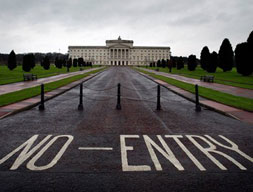Collaborate to Compete
Politically, leaders on both sides of the border and in the UK are emphasizing the benefits of a closer economic union, noting, in the words of the Northern Irish Social Democratic and Labour Party (SDLP), “North-South Makes Sense.” In the ROI, Taoiseach (Prime Minister) Bertie Ahern of the Fianna Fáil party has also called for increased cross-border business ties. Political parties of all shades speak of the need for mutual marketing of the island to outside investors, particularly in the face of the external challenges of globalization.
Many in the North are careful to add that this cooperation will not be had at the cost of NI’s economic relationship with the UK, the world’s fourth largest economy. Closer ties should not been viewed as a threat, says SDLP leader Mark Durkan. “People who are unionist, nationalist or neither should have nothing to fear from dynamic North-South co-operation,” he said. “We are all losers without it.” The UK, for its part, has grown weary of subsidizing a public sector-heavy NI and wants to reduce the amount paid by British taxpayers. NI Secretary of State Peter Hain has emphasized repeatedly that the key to the province’s economic success is accepting that the current reliance on the public sector is untenable and must be replaced with a private sector boom, which ties with the South can only expedite.
The pressure to piggyback on the South’s success has even the Democratic Unionist Party (DUP), which is strongly opposed to political unification, trumpeting increasing NI/ROI business relations, as long as it is done for economic, not political reasons. Says DUP deputy Peter Robinson, “There are many areas where working together with the Irish Republic would be enormously to our mutual advantage and we should not allow politics to be an obstacle to such an advance. Equally, it would be a real threat to North-South relations if there were politically motivated attempts to enhance links where the merits of the individual proposals are lost in the politics of it all.”
Sectarian Suspicions
After three decades of conflict between Republicans fighting for a “reunited Ireland” and the Unionists or Loyalists defending ties to the queen, calls for an “all-island” anything can result in a flaring of sectarian tempers. Despite diplomatic advances and the IRA cease-fire, neighborhoods and schools remain segregated and Catholic-Protestant mistrust continues to be a powerful factor in politics, and to a lesser degree, in business relations. Equally pernicious is the recalcitrance of the Northern Irish political establishment. Though the 1998 Good Friday Agreement established power-sharing between Catholics and Protestants as a model that could restore permanent peace to the province, the Assembly was suspended in 2002 when the Unionist (Protestant, pro-union with the UK) politicians threatened to withdraw due to revelations that the IRA paramilitary groups were still operating.
The two main architects of the plan, UK Prime Minister Tony Blair and the ROI’s Bertie Ahern, have set a deadline of November 2006 for the two dominant political groups to reach agreement on their issues or face being governed directly by London, with input from Dublin. The theory is that if, after eight years, the two sides have not been able to reach a compromise that permits them to govern, they never will. The Democratic Unionists have rejected the deadline, saying that they will not form a government with Sinn Féin until it meets certain conditions.
High Price of Politics
For some investors, the lack of an operating, devolved (independent) government makes NI an unpredictable business environment compared to the South. For the first time in decades, however, the price of this inability to cooperate seems too much to pay for many Northern Irish, especially when their Southern cousins are reveling in the booty of their economic boom. It remains to be seen whether the desire of the Northern Irish for a bigger piece of the pie will do what decades of violence, political negotiation, and world attention have not: help their government see its way clear to political cooperation.
- Previous: Pork Outranks Politics



